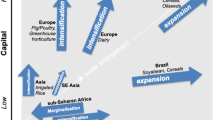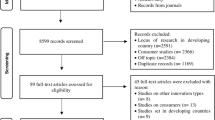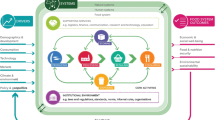Abstract
The organic sector is in an ongoing, but somewhat ambiguous, process of differentiation. Continuing growth has also entailed intensified competition and the emergence of conventional structures within the sector. Producers are under pressure to adapt their terms of production to these developments, bearing the risk that the original values and principles of organic farming may become irrelevant. To confront these tendencies and maintain their position on the market, organic producers and processors have launched a number of organic–fair initiatives. As some consumers attach importance to ethical aspects of consumption, these actors sense market opportunities in such quality differentiation. This article presents results of a study on current organic–fair criteria, as formulated by such initiatives. All of them define standards of distributive, procedural and informational fairness, with fair prices for producers and processors and long-term agreements being core standards. We show that distributive and procedural fairness are closely linked. Although organic–fair initiatives and their main protagonists focus on external fairness, such as fair prices for farmers, thus far internal concerns, such as minimum wages or employee involvement, are of less importance. The initiatives exemplify the differentiation of quality-oriented organic food producers in highly competitive markets. They have the potential to revitalise the original values of the sector and contribute significantly to ethical standardization therein. In order to make a substantial contribution to future development of the sector, a critical examination of aspects of internal fairness as well as the formulation of appropriate standards in this field is recommended.
Similar content being viewed by others
Notes
The former EC 2092/91 and current EC/834/2007.
These values are: regionality, environmental protection, absence of genetic modification, animal welfare, food quality, transparency, and fairness for consumers and farmers. (http://www.zurueckzumursprung.at/).
See under: 3.2 Reliable trade relations (http://www.naturland.de/fileadmin/MDB/documents/Richtlinien_deutsch/Naturland-Richtlinien_Fair-Richtlinien.pdf).
References
Adams, J. S. (1965). Inequity in social exchange. In L. Berkowitz (Ed.), Advances in experimental social psychology (Vol. 2, pp. 267–299). New York/London: Academic Press.
Agrarbündnis (2007). Materialien zur “Tagung Fairness und Ethik im ökologischen Landbau”. 18. und 19. Juni 2007 in Fulda. http://www.agrarbuendnis.de/index.php?id=238. Accessed October 1, 2012.
Blodgett, J. G., Hill, D. J., & Tax, S. S. (1997). The effects of distributive, procedural, and interactional justice on postcomplaint behavior. Journal of Retailing, 73(2), 185–210.
Browne, A. W., Harris, P. J. C., Hofny-Collins, A. H., Pasiecznik, N., & Wallace, R. R. (2000). Organic production and ethical trade: Definition, practice and links. Food Policy, 25, 69–89.
Colquitt, J. A., Conlon, D. E., Wesson, M. J., Porter, C. O. L. H., & Ng, K. Y. (2001). Justice at the millennium: A meta-analytic review of 25 years of organizational justice research. Journal of Applied Psychology, 86(3), 425–445.
Darnhofer, I. (2006). Organic farming between professionalisation and conventionalisation—The need for a more discerning view of farmer practices. Joint Organic Congress, Odense, Denmark, May 30–31, 2006.
Darnhofer, I., Lindenthal, T., Bartel-Kratochvil, R., & Zollitsch, W. (2010). Conventionalisation of organic farming practices: from structural criteria towards an assessment based on organic principles. A review. Agronomy for Sustainable Development, 30 67–81 (Accepted April 8, 2009).
De Wit, J., & Verhoog, H. (2007). Organic values and the conventionalization of organic agriculture. NJAS, 54(4), 449–462.
Deutsch, M. (1975). Equity, equality, and need: What determines which value will be used as the basis of distributive justice? Journal of Social Issues, 31(3), 137–149.
Henderson, E. (2004). Principles of organic agriculture: Why social justice must be included. Ecology and Farming, No. 32.
Henderson, E., Mandelbaum, R., & Sligh, M. (2002). Toward social justice and economic equity in the food system: A call for social stewardship standards in sustainable and organic agriculture. Ecology and Farming, No. 31.
IFOAM (2005). The principles of organic agriculture. http://www.ifoam.org/about_ifoam/principles/index.html. Accessed July 1, 2010.
Jaffee, D. & Howard, P. (2009). Corporate cooption of organic and fair trade standards, Agriculture and Human Values, December 2010, 27 (4), 387–399. Published online: 26 July 2009.
Jaffee, D., Kloppenburg, J. R., & Monroy, M. B. (2004). Bringing the “Moral Charge” home: Fair trade within the north and within the south. Rural Sociology, 69(2), 169–196.
Klendauer, R. (2006). Fairness und Gerechtigkeit. In: Bierhoff, H.-W., Frey, D. (Hrg.): Handbuch der Sozialpsychologie und Kommunikationspsychologie. Göttingen et al.: Hogrefe Verlag, S. 187–195.
Kumar, N. (1996). The power of trust in manufacturer-retailer relationships. Harvard Business Review, 74 (November–December 1996), 92–106.
Lautermann, C., Pfriem, R., Wieland, J., Fürst, M., & Pforr, S. (2005). Ethikmanagement in der Naturkostbranche—Eine Machbarkeitsstudie. Metropolis.
Leventhal, G. S. (1980). What should be done with equity theory? New approaches to the study of fairness in social relationships. In K. J. Gergen, M. S. Greenberg, & R. H. Willis (Eds.), Social exchange: Advances in theory and research (pp. 27–55). New York, NY: Plenum.
Lind, E. A., & Tyler, T. R. (1988). The social psychology of procedural justice. New York: Plenum Press.
Moore, G. (2004). The fair trade movement: Parameters, issues and future research. Journal of Business Ethics, 53, 73–86.
Padel, S. (2008). Values of organic producers converting at different times: results of a focus group study in five European countries. International Journal of Agricultural Resources, Governance and Ecology, 7(1/2), 63–77.
Padel, S. & Ayres, N. (2008). Relevance of ethical trade and management concepts for organic food. In Padel & Gössinger (2008). Farmer consumer partnerships. Communicating Ethical Values: A conceptual framework, Deliverable no. 1 (WP 1 and WP 2), (pp. 5–19). http://orgprints.org/12821/.
Padel, S, Nicholas, P., Jasinska, A., Ayres, N, & Lampkin, N. (2008b). Organic Plus: organic food with additional values going beyond organic standards. In Padel & Gössinger (2008). Farmer consumer partnerships. Communicating Ethical Values: A conceptual framework, Deliverable no. 1 (WP 1 and WP 2), (pp 20–41). http://orgprints.org/12821/.
Padel, S., Nicholas, P., Jasinska, A. & Lampkin, N. (2008a). Ethical concerns associated with organic food in Europe. 16th IFOAM Organic World Congress. Modena, Italy, June 16–20, 2008.
Padel, S., Röcklingsberg, H., & Schmid, O. (2009). The implementation of organic principles and values in the European Regulation for organic food. Food Policy, 34, 245–251.
Raynolds, L. (2000). Re-embedding global agriculture: The international organic and fair trade movements. Agriculture and Human Values, 17, 297–309.
Reed, D. (2009). What do corporations have to do with fair trade? Positive and normative analysis from a value chain perspective. Journal of Business Ethics, 86, 3–26.
Renard, M.-C. (2003). Fair trade: Quality, market and conventions. Journal of Rural Studies, 19(1), 87–96.
Schäfer, M. & Kröger, M.(2010). Between ‘back to the roots’ and marketing orientation—an overview of organic ‘fair‐regional’ initiatives in Germany. 9th European IFSA Symposium, 4‐7 July 2010, Vienna (Austria). http://ifsa.boku.ac.at/cms/fileadmin/Proceeding2010/2010_WS4.3_Schaefer.pdf.
Spiller, A. (2007): Chancen und Relevanz von fairen Preisen auf dem boomenden Biomarkt. Vortrag auf dem Unternehmensworkshop: “Regionaler Biomarkt: Faire Preise für die Bauern—Wofür zahlen Verbraucher mehr?”, 25./26.09.07 in Willingen-Usseln, Veranstalter: Upländer Bauernmolkerei, Kasseler Institut für ländliche Entwicklung, Bioland.
Thibaut, J. W., & Walker, L. (1975). Procedural justice: A psychological analysis. Hillsdale, NJ: Erlbaum Associates.
Tyler, T. R., & Blader, S. L. (2000). Cooperation in groups: Procedural justice, social identity, and behavioral engagement. Philadelphia: Psychology Press.
Zander, K., & Hamm, U. (2008). Communication of ethical values in organic farming. 16th IFOAM Organic World Congress. Modena, Italy, June 16–20, 2008. http://orgprints.org/view/projects/conference.html.
Zander, K., Hamm, U., Freyer, B., Gössinger, K., Naspetti, S., Padel, S., Stolz, H., Stolze, M., Zanoli, R.(2011). Consumer concerns regarding additional ethical attributes of organic food. In Neuhoff, D., Halberg, N., Rasmussen, I. A., Hermansen, J.E., Ssekyewa, C., Sohn, S. M. (Hrsg.). Organic is Life: Knowledge for tomorrow. ISOFAR, Bonn, (pp. 22-25.).
Author information
Authors and Affiliations
Corresponding author
Rights and permissions
About this article
Cite this article
Kröger, M., Schäfer, M. Between Ideals and Reality: Development and Implementation of Fairness Standards in the Organic Food Sector. J Agric Environ Ethics 27, 43–63 (2014). https://doi.org/10.1007/s10806-013-9444-0
Accepted:
Published:
Issue Date:
DOI: https://doi.org/10.1007/s10806-013-9444-0




